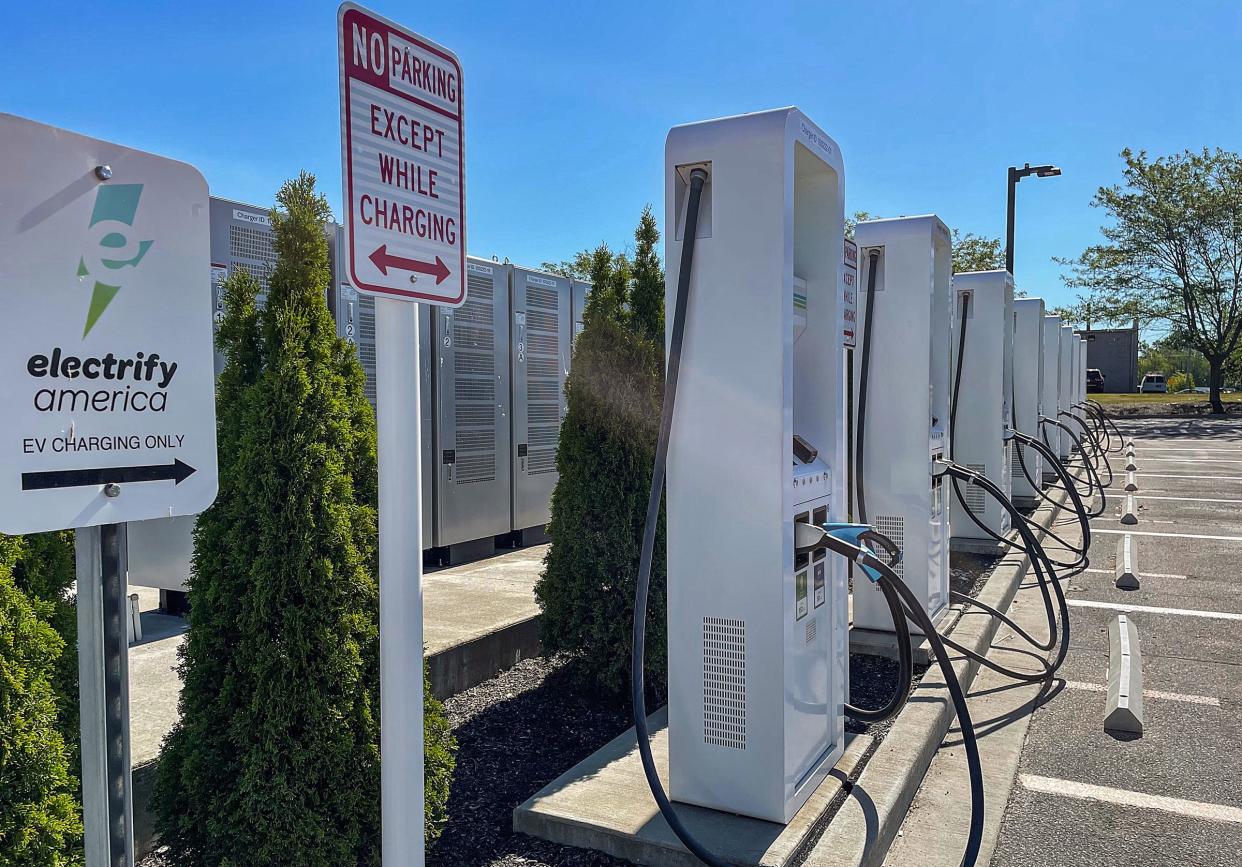Ballard and Ritter: Switching to electric vehicles will make U.S. stronger, safer

Through bipartisan federal legislation, leadership from states and cities, and private sector investments, electric vehicles are bringing a boom in American manufacturing and jobs and finally ending oil’s monopoly on transportation.
Bad actors who don’t share American values control the global oil supply and will continue to manipulate prices and constrain supply. This monopoly not only threatens our summer road trips but also threatens our overall economic and national security. The United States finally has a chance to break this monopoly through the confluence of policy and technology, ending our overreliance on oil by building an electric transportation future.
The public health and emissions impacts from the switch to EVs are well known and often discussed, but the national security implications are often overlooked.
We have spent trillions of dollars and lost thousands of lives in pursuit of a reliable oil supply, yet we remain incredibly vulnerable to unpredictable, uncontrollable developments like the Russian invasion of Ukraine. The very nature of oil as an energy source leaves us susceptible to the demands of the countries that control its supply.
How can we honor the Americans who fought for freedom and independence if we pass up on an opportunity to remove ourselves from the influence of foreign actors who don’t share those values?
Electricity, unlike oil, can be produced 100% domestically and from diverse sources, insulating our energy supply from global supply disruptions due to war, economic instability or market manipulation from OPEC. Producing enough domestic electricity to meet demand is a monumental challenge and an equally significant opportunity. Jobs building out the electric grid, developing and manufacturing EV technology, or working in wind, solar, hydro, geothermal and nuclear are among the best-paid, most secure and fastest-growing positions on the market.
But energy production, vehicle and charging equipment assembly are only part of the equation. EV batteries require critical minerals, which are often sourced overseas.
We need a unified plan to source these minerals, or we risk replacing our dependence on oil with an equally dangerous reliance on minerals. With proper planning, we can take advantage of this once-in-a-generation opportunity to build supply chains within the United States and with allies who share our values.
We should source minerals domestically; where impossible, we must act quickly to establish secure and efficient supply chains that don’t endanger American lives or force us to compromise on American values. These processes take time, so there’s no time to waste with the electrification transition already underway.
As a Democratic former governor and Republican former mayor, we recognize that the electrification transition also opens up great opportunities to expand American manufacturing capabilities and create good American jobs.
Cities and states around the country, both red and blue, are seeing economic development opportunities and job growth in the EV sector, and the federal government is investing hundreds of millions of dollars through bipartisan legislation. A recent report indicates that Ohio alone will create 25,000 new jobs in the EV sector by 2030. These jobs will build the vehicles, batteries and charging equipment necessary for the EV transition. Hyundai and Rivian are building EV factories in Georgia, while Ford is building EV factories in Kentucky and Tennessee. Kempower, a Finnish EV charging station manufacturer, is opening a plant in North Carolina, while Siemens is manufacturing EV charging stations in Texas.
The EV revolution would not have been possible without historic policies at the local, state and federal levels. In Colorado, I (Gov. Ritter), passed one of the country’s first EV tax credits in 2009, and subsequent administrations have maintained our state’s leadership. In Indianapolis, I (Mayor Ballard) began shifting the city’s fleet to electric vehicles, oversaw the installation of EV charging stations across the city and began an electric car-sharing program. Policies like these at the local and state level are critical to supporting the EV transition.
In short, the question we now face is not whether the electrification transition will occur but what our role in it will be. Now is not the time to back down from EV commitment through investment and strong policies.
If we do this right, we can strengthen the economy, bolster our national security and reestablish the United States as a global leader in manufacturing. If we fail to act decisively, we cede control of the energy and automotive industries to China, perpetuate our dependence on imported energy and create a new reliance on imported technology.
We are excited to see many of our peers in cities and states across the country embrace the transportation electrification revolution.
Leaders at all levels on both sides of the aisle need to recognize the tremendous opportunities transportation electrification brings. The EV revolution will create jobs, protect our security and improve public health, benefitting all Americans, regardless of political affiliation, location or economic status. That’s why we’re calling for officials to advance transportation electrification because it is not a red vs. blue issue; it’s a red, white and blue issue.
Greg Ballard is the two-term former Republican mayor of Indianapolis, Indiana, where he served from 2008 to 2016. Bill Ritter is the former Democratic governor of Colorado from 2007-2011. Since February 2011, Ritter has served as the director of the Center for the New Energy Economy at Colorado State University.
This article originally appeared on Indianapolis Star: Opinion: EV transition will create jobs, improve public health

